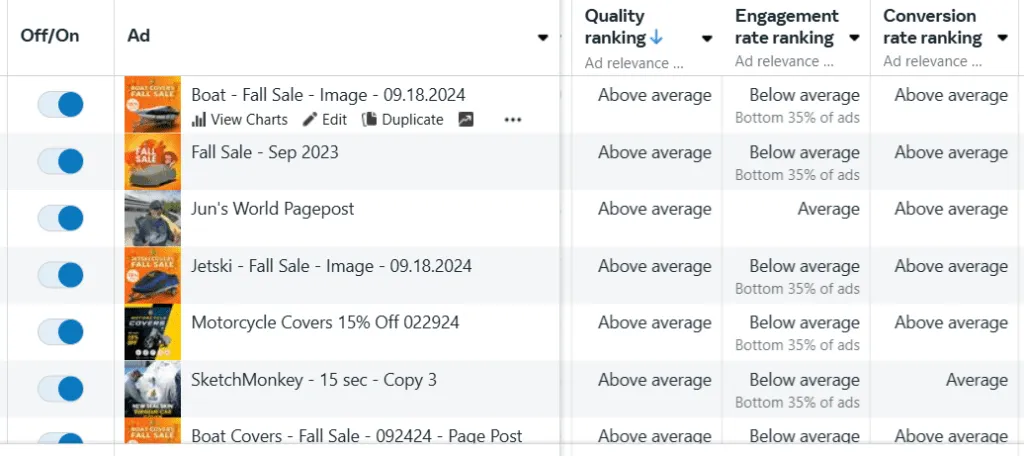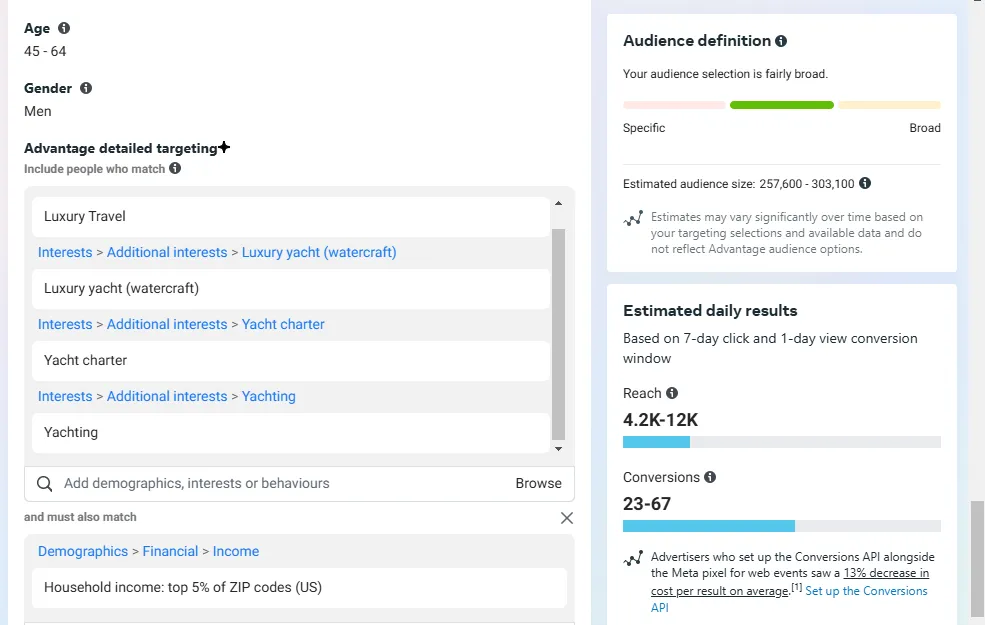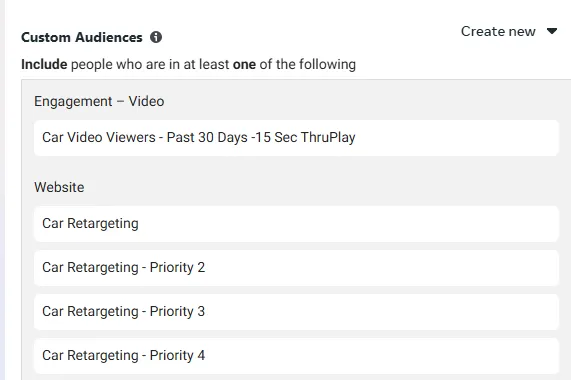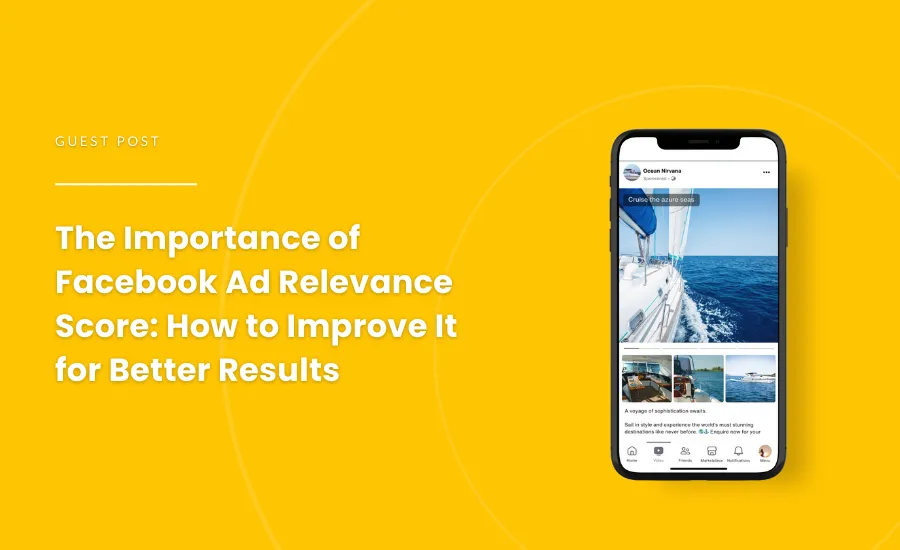Did you know that Facebook ads with a higher relevance score can lower your cost per result and improve the click-through rate? To create impactful ads, it’s crucial that they attract interest, resonate with your target audience, and drive engagement. Facebook’s Ad Relevance Score plays a key role in determining the success of your campaigns.
Introduced by Facebook to help advertisers optimize their campaigns, this score influences not only how often your ads are shown but also how much you pay for each impression or click. Ads with higher relevance are rewarded with better visibility and lower costs, leading to a more effective and efficient campaign.
Comprehending the significance of the relevance score and discovering effective ways to enhance it can lead to improved performance, reduced advertising expenses, and ultimately, a greater return on investment.
What is Facebook Ad Relevance Score?
Previously, Facebook’s relevance score was a single score between 1 and 10 that provided a general sense of how relevant your ad was to the audience you targeted. Later, Facebook upgraded this metric by dividing it into three key components: Quality Ranking, Engagement Rate Ranking, and Conversion Rate Ranking. Each of these sub-scores offers a detailed understanding of your ad’s performance and aids in identifying areas for enhancement.
- Quality Ranking: This measures how the quality of your ad is viewed in relation to competing ads aimed at the same audience.
- Engagement Rate Ranking: This evaluates the anticipated level of engagement your ad will receive compared to others.
- Conversion Rate Ranking: This assesses how likely your ad is to achieve conversions compared to other ads with similar goals.
While each ranking plays a distinct role, they all work together to show how effectively your ad meets the expectations and desires of your target audience.
Whether you want more engagement, clicks, or conversions, boosting your relevance score is key to getting better results.

Why is Facebook Ad Relevance Score Important?
A high Facebook relevance score can significantly benefit your advertising efforts in multiple ways:
- Lower Costs: Facebook rewards ads with a higher relevance score by lowering your cost-per-click (CPC) and cost-per-impression (CPM). This means that ads performing well will be cheaper to run.
- Better Reach: Ads with higher relevance scores tend to be shown more frequently to your target audience because Facebook prefers to show content that users are likely to engage with.
- Increased Engagement: An ad that resonates with your audience will naturally generate more clicks, shares, and conversions. The relevance score helps ensure that you’re delivering ads that matter to your audience.
- Optimized Campaign Performance: With a better understanding of your ad’s performance based on the relevance score metrics, you can adjust and improve future campaigns, leading to more effective results over time.
How to Improve Your Facebook Ad Relevance Score
Enhancing your Facebook Ad relevance score can lead to improved ad performance, a wider audience reach, and lower expenses. Here are some effective strategies you can implement to elevate your score:
Improve Quality Ranking
This is important for improving how your audience sees the quality of your ad compared to other ads aimed at the same people.
Use High-Quality Visuals
Whether it’s an image or video creative, the visual component of your ad is what catches the audience’s attention first. Using clear, sharp, and visually appealing images is essential to stand out in a crowded feed. For instance, if you’re a shoe retail brand, your ad creative could feature a marathon runner showcasing the durability and comfort of your shoes, emphasizing their performance during a high-intensity race.


Your visuals should be relevant to your message and reflect the essence of your brand. Consistent branding through colors, fonts, and imagery can also reinforce your brand identity and make your ads more recognizable. Since Facebook is a highly visual platform, investing in professional or well-designed visuals can significantly improve your quality ranking.
Write Compelling and Relevant Copy
The wording you choose must be brief, straightforward, and specifically cater to the wants and needs of your target audience. Avoid overly complicated language or long-winded explanations; instead, focus on crafting a message that speaks to your audience’s interests and offers a solution to their problems. For example, if your shoe retail brand has recently launched a new line of sneakers, you could create something like: “Step into comfort with our best-selling sneakers – designed for all-day wear, stylish and built to last. Perfect for those who value both fashion and function.”
Strong, compelling headlines can grab attention, while a clear value proposition in the body of your ad can make people more likely to engage with it. Simplifying your message increases the likelihood that your ad will be seen as high-quality.
A/B Test Different Versions of Your Ads
By developing several variations of your ad and experimenting with different components—like headlines, visuals, or calls to action—you can determine which version connects most effectively with your audience. The A/B testing process allows you to fine-tune your ads for better performance.
For example, one version of your ad might attract more engagement, while another might lead to more clicks. Analyzing this data helps you determine which elements contribute to a higher-quality ad, enabling you to continually optimize for better results.

Maintain Ad Consistency with the Landing Page
You must ensure that your ad delivers a consistent experience. This means that the messaging and design of your ad should align with the landing page it directs users to. If your ad promotes a specific offer or product, your landing page should reflect the same offer or product without any surprises.
A smooth transition from ad to landing page helps maintain user trust, reducing bounce rates and improving overall engagement. Additionally, a fast-loading landing page is crucial, as slow speeds can frustrate users and negatively impact your quality ranking.
Enhance Engagement Rate Ranking
An increased engagement rate shows that users are interacting with your ad through likes, shares, or comments, which not only enhances your score but also improves the ad’s visibility.
Target the Right Audience
A highly effective method for enhancing engagement is to make sure your ad is seen by the right audience. You can make use of Facebook’s targeting features to refine your audience by considering factors such as age, interests, behaviors, and geographic location.
The greater the relevance of your ad to its audience, the higher the chances of engagement. For instance, if you’re advertising a fitness product, focusing on users who are passionate about health and wellness can significantly boost engagement rates.
Personalizing your ads based on audience segments can significantly improve conversion rates. If you have different products for men and women, create specific ads that speak directly to each audience. Personalized messaging resonates more and increases the likelihood of conversion.

This particular brand is targeting luxury, yacht interests, and the top 5% of household income because their products, such as premium boat covers or specialized accessories, are designed for high-end consumers who invest in quality and durability. By focusing on individuals with a strong interest in luxury items and high disposable income, the brand ensures they reach an audience that is more likely to appreciate and purchase their premium offerings, which align with their customers’ lifestyle and purchasing power.
Incorporate Strong Calls to Action (CTAs)
A clear and compelling call to action can significantly increase engagement. Encourage your audience to take specific actions, such as liking your post, visiting your website, or sharing their thoughts in the comments. Clear and compelling CTAs help users grasp your intended action, resulting in increased interaction rates.
Utilize Interactive Content
Incorporating interactive elements, such as polls, quizzes, or questions, can boost engagement significantly. Interactive content invites users to participate rather than passively consume information, making them more likely to engage. For example, asking your audience their opinion on a relevant topic can spark conversation and encourage comments.
Retarget Previous Visitors
Retargeting ads at those who have previously engaged with your brand can increase engagement levels. As these individuals are already familiar with your offerings, they are more likely to interact with your ads again. Create tailored ads that speak to their previous interactions or highlight new products and offers relevant to their interests.

A well-known brand like SealSkin that sells car, truck, boat, and patio covers relies on retargeting as a key strategy. By using online ads that specifically showcase the benefits and features of their covers, such as durability and protection, retargeting reminds potential customers about the product and encourages them to complete their purchase. This method helps increase conversions by reaching out to individuals who have already shown interest but need an extra nudge to make a decision.
Encourage User-Generated Content
When your audience shares their experiences with your brand, it can actually create a great positive impact. Encourage customers to post photos or reviews, and consider featuring this content in your ads. User-generated content not only increases engagement but also builds trust and authenticity around your brand.
Boost Conversion Rate Ranking
This aspect is crucial for enhancing your Facebook Ad relevance score, as it reflects how effectively your ads are driving users to take actions such as completing purchases or signing up. A higher conversion rate means your ads are reaching the right audience and encouraging them to act.
Optimize Your Landing Page
Your landing page should provide a seamless experience that aligns with your ad’s promise. Make sure that your landing page’s content, design, and messaging align with what users anticipate after clicking your ad.
A landing page that is well-optimized, with a straightforward call to action, can greatly improve conversion rates. You must also ensure the page loads swiftly and is compatible with mobile devices, as slow-loading pages can drive users away.
Offer Incentives
Providing incentives such as discounts, limited-time offers, or free trials can effectively encourage conversions. Highlighting these offers in your ads can capture attention and prompt users to take immediate action. Make sure the incentives are clearly visible in your ad and easily accessible on your landing page to maximize their impact.
Monitor and Analyze Performance
Regularly monitoring your ad performance and analyzing conversion data can help identify what’s working and what isn’t. You can use Facebook Ads Manager to analyze important metrics, including:
- Click-through rates
- Conversion rates
- User interactions on your landing page
Analyzing this data allows you to make the necessary adjustments to your ads, targeting, and landing pages to enhance overall performance.
Final Thoughts
Your ad should deliver on what it promises. If users click on an ad expecting one thing and receive something else, it can hurt engagement, lead to negative feedback, and lower your quality ranking. Clickbait headlines may grab attention but often result in poor user experience. Facebook penalizes ads that use these tactics, which can drop your score.
Facebook wants to prioritize content that delivers value to users. Ads that spark positive engagement (likes, comments, shares) are often considered higher quality. Consider engaging your audience by posing questions, conducting polls, or encouraging them to share their experiences in the comment section. However, avoid engagement baiting (e.g., “Like this post if you agree”), as it can lead to penalization.
Facebook advertising success doesn’t happen overnight, but by consistently optimizing your ads based on relevance score metrics, you’ll be well on your way to achieving sustainable, high-performance ad campaigns.

Andy Beohar is the Managing Partner at SevenAtoms, a leading PPC Advertising agency. SevenAtoms is dedicated to driving growth for SaaS and B2B businesses through innovative and optimized paid search and is recognized by Google as a Google Premier Ads partner. At SevenAtoms, Andy plays a strategic role in managing paid search campaigns.
Have some great content up your sleeve? We invite you to reach out to us. We are excited to collaborate with talented writers and feature high-quality content on our blogs.








